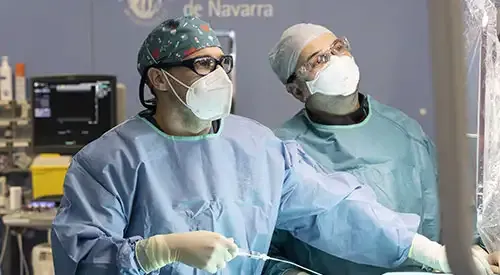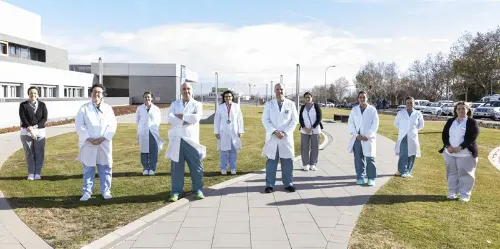Pelvic varicose veins or pelvic congestion syndrome
"Varicose vein embolization has a high success rate, in 90% of cases the pain decreases considerably and in almost 50% the pain disappears completely."
DR. JOSÉ IGNACIO LEAL
PERSON IN CHARGE. VASCULAR SURGERY SERVICE

What are pelvic varicose veins?
Pelvic varicose veins are dilations of the venous network in the uterine area that frequently appear in women who have been mothers. These varicose veins produce an increase in pressure and can end up generating other varicose veins in lower areas, for example in the genital area and legs.
When there are varicose veins in the pelvis and associated symptoms appear, we speak of pelvic congestion syndrome. This is a common problem but difficult to diagnose because it is not detected with the current protocols that are performed when a woman comes for consultation with chronic abdominal pain.
Our team of vascular surgeons, gynecologists and interventional radiologists have extensive experience in the outpatient treatment of pelvic varicose veins with a high success rate.

What are the symptoms of pelvic varicose veins?
The most frequent symptom of pelvic varices is a feeling of heaviness and pain in the abdominal area or in the legs. It is a pain reminiscent of menstrual pain but appears outside the cycle and causes chronic abdominal pain, which increases when standing.
In some cases there is also pain in the legs in the days before menstruation or ovulation or pain during sexual intercourse (dyspareunia).
The most common symptoms are:
- Pelvic pain in the lower abdomen that worsens with prolonged standing.
- Pain during menstruation or sexual intercourse.
- Back pain.
- Pain or heaviness in the legs.
Do you have any of these symptoms?
You may have pelvic congestion syndrome
What are the risk factors?
Factors predisposing to the occurrence of pelvic congestion syndrome are:
- Women between 30 and 50 years of age.
- Women who have had several pregnancies.
- Genetic predisposition, if there is a history of family members with venous problems.
- Women with hormonal alterations.
How are pelvic varicose veins diagnosed?

Pelvic congestion syndrome appears quite frequently, although it is difficult to diagnose correctly. Normally these are women who have undergone many diagnostic tests (gastroscopies, ultrasound scans, colonoscopies, etc.) in an attempt to determine the origin of the pain, but since no specific tests have been performed for this problem, the cause is not known.
For its diagnosis it is necessary to perform an abdominal or transvaginal Doppler ultrasound, an angio-CT or an MRI to assess more specifically the venous network of the pelvic area.
The definitive diagnosis is obtained by performing a pelvic phlebography, a small catheter is introduced to reach the pelvic area and the affected area is directly examined by injecting contrast. In the same procedure the treatment can be performed directly, which is a great advantage for the patient.
How are pelvic varicose veins treated?
Embolization of pelvic varicose veins is the treatment of choice. The objective is to close the venous blood flow that reaches these dilated varicose veins and redirects it to healthy veins.
It is a procedure that can be performed on an outpatient basis, lasts about an hour and in which liquid embolizing agents are used, very effective in closing the entire affected venous network, regardless of its size, in a single session.
It is a technique with a high success rate, in 90% of cases the pain decreases considerably and in almost 50% of cases the pain disappears completely.
In addition, it is a technique that can be repeated without problem, if the woman becomes pregnant again and pelvic varicose veins reappear.
Where do we treat it?
IN MADRID
The Vascular Surgery Service and the Interventional Radiology Unit of the Clínica have state-of-the-art technology for the diagnosis, treatment and surgery of vascular pathologies. Our extensive experience, framed in the quality care environment of the Clínica Universidad de Navarra, allows us to offer patients the most effective and innovative treatments.
We have an operating room specialized in vascular surgery, equipped with advanced equipment for the surgical treatment of the most important vascular diseases.



